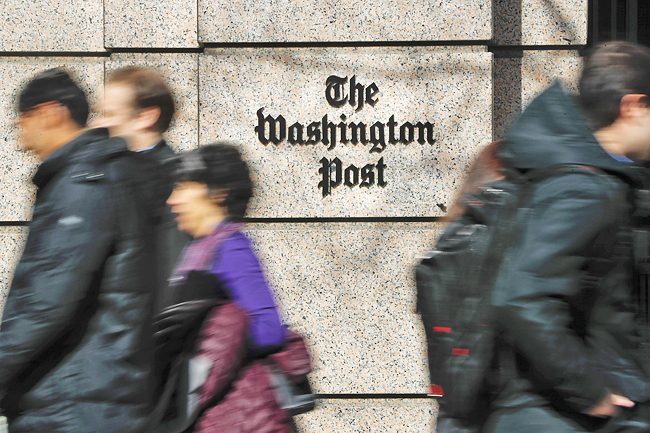NEW YORK (AFP) – The prestigious Washington Post is in crisis, with pressure on from owner Jeff Bezos to change its money-losing ways.
The Post‘s managing editor abruptly resigned; a chosen successor withdrew under fire, and a boss has been targeted in the newspaper’s columns.
At the heart of the storm is the WaPo’s new Chief Executive Officer (CEO) Briton William Lewis, who was given a mission by Amazon founder Bezos when he appointed him last autumn.
Lewis was asked to turn around a newspaper that continues to pile up Pulitzer Prizes half a century after the Watergate scandal it instigated, but which has lost USD77 million in 2023 despite job cuts and the disappearance of its Sunday supplement.
However, the former journalist, who made history in the late 2000s with a scoop on the expenses of British members of Parliament when he was editor of the Daily Telegraph, is finding his position increasingly vulnerable.
For weeks now, revelations have multiplied about his role, when he was working for the Murdoch family’s conservative media group about 12 years ago, in a scandal of illegal phone tapping by the tabloid The News of the World.
On Friday, Lewis was at the centre of an investigation by his own journalists.
According to the Washington Post, he gave the go-ahead in 2011 for the destruction of thousands of emails, fueling suspicions that he was destroying evidence, which he denies.

‘TRUMP BUMP’
As the United States (US) presidential election approaches, the affair is poisoning the atmosphere at a long-vaunted newspaper that is “not doing well economically”, Northeastern University journalism professor Dan Kennedy tells AFP.
The Post was among trusted news outlets that benefited from the upheaval that marked Trump’s four years in the White House that ended with his loss to President Joe Biden.
The Post “was seen as a place that offered really tough, truth-telling coverage” of Trump, according to the professor.
Trump’s departure from the White House meant fewer attention-grabbing stories to keep readers engaged.
“When Donald Trump left the White House, the Trump bump that helped a lot of newspapers disappeared,” Kennedy said.
“And the Post was hit especially hard.”
By the end of 2022, the Post would have 2.5 million subscribers compared with three million subscribers when Biden took office in early 2021, according to the Wall Street Journal.
Meanwhile, rival New York Times has grown to more than 10 million subscribers, the fruit of a strategy to diversify into fun topics such as games, food, and lifestyle while still serving up hard news.
US media quoted Lewis as telling editorial staff in early June that he “can’t sugarcoat it anymore” – the paper has lost a lot of money and people’s interest in its articles.
THIRD NEWS TEAM
The day before that editorial meeting, Post journalists learned of the resignation of editor-in-chief Sally Buzbee.
Buzbee is said to have disagreed with Lewis’s strategy to split the editorial department into three divisions: news, opinion, and a new third unit devoted to social media and service journalism.
The contours of this “third newsroom” remain unclear, but it seems aimed at reviving readership in a leap into the unknown for the newspaper.
Within the Murdoch family group, Lewis was the boss of the Wall Street Journal (2014-2020), another flagship of the US press.
However, articles in the New York Times and the Post pointed to questionable methods employed under his watch and that of former colleague Robert Winnett, whom Lewis chose to replace Buzbee.
Published allegations include paying informants, using data from hacked phones, or intermediaries using phony identification to get information. Winnett withdrew from consideration for the post following those revelations.
Professor Kennedy believes Lewis has no choice but to leave the Post because he has lost the confidence of the team there.
“The body is rejecting the transfusion,” Post veteran David Maraniss wrote on his Facebook page, adding he didn’t know anyone who thinks the situation can stand as it is.
“If he can’t inspire the staff… the Post will sail without direction and its best people will leave,” Kennedy said of Lewis.
For many observers, the outcome of the crisis lies in the hands of billionaire Bezos, who bought the Post for USD250 million in 2013.
So far, Bezos has backed his CEO.




